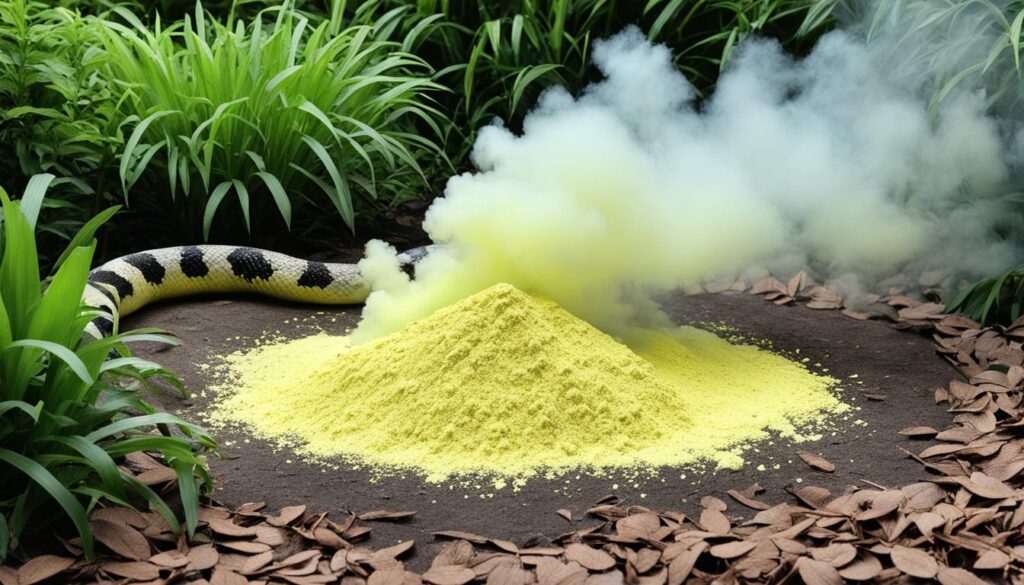When it comes to snake deterrence, there are numerous methods and techniques that are widely promoted. One such method is the use of sulfur as a snake repellent. But does it really work? Can sulfur keep snakes away from your property?
According to multiple sources and studies, the answer is no. Sulfur has been found to be ineffective in deterring snakes. In fact, it may even make snakes more agitated and aggressive. So relying on sulfur as a means of snake deterrence is not recommended.
While it might be tempting to try out various snake repellents, it’s important to rely on effective and proven techniques. In the following sections, we’ll explore natural methods for snake deterrence and highlight which methods to avoid.
In this article, we’ll discuss the effectiveness of sulfur in keeping snakes away and explore alternative methods for snake deterrence.
Natural Snake Deterrents
When it comes to keeping snakes away from your property, there are natural methods that can be effective. By implementing these deterrents, you can create an environment that is less appealing to snakes and reduce the chances of them taking up residence on your property.
One of the key steps in snake deterrence is maintaining your grass. Regularly mowing and maintaining your lawn not only keeps it looking neat and tidy but also makes it less enticing for snakes to hide in. Snakes prefer tall grass as it provides cover and protection. By keeping your grass short and well-maintained, you eliminate potential hiding places for snakes.
Additionally, trimming trees and shrubs away from your home can significantly reduce the likelihood of snakes making their way onto your property. Overgrown bushes and branches provide ideal hiding spots for snakes. By keeping them trimmed and away from your house, you eliminate these potential snake habitats and make your property less attractive to them.
Feeding your pets indoors is another effective way to deter snakes. Snakes are attracted to properties that have a high population of insects and rodents, as these serve as their primary food source. By feeding your pets indoors and properly storing their food, you minimize the presence of these food sources and consequently, reduce the chances of attracting snakes.

Avoid Ineffective Methods
When it comes to snake deterrents, it is crucial to steer clear of ineffective methods. While some widely believed approaches may seem promising, they can ultimately prove futile and even pose risks. Avoiding these ineffective methods will save you time, money, and potential harm.
Mothballs:
Contrary to popular belief, mothballs do not repel snakes. In fact, they can be harmful to both humans and pets. Mothballs contain toxic chemicals that can be dangerous when ingested or inhaled. Relying on mothballs as a snake deterrent is not only ineffective but also hazardous to your wellbeing.
Ceramic Eggs and Golf Balls:
Using ceramic eggs or golf balls to deter snakes is another ineffective method. These objects do not have any inherent properties that repel snakes. In fact, they can potentially harm snakes if ingested, causing injury or even death. Instead of relying on these ineffective items, it is best to explore alternative snake deterrent strategies.
Commercial Snake Repellents:
Commercial snake repellents may seem like a convenient solution, but they have been proven to be ineffective and a waste of money. Despite their marketing claims, these products fail to consistently repel snakes. Investing in commercial snake repellents may only offer a false sense of security without delivering the desired results.
Instead of relying on mothballs, ceramic eggs, or commercial snake repellents, it is advisable to explore more effective and safer alternatives. By understanding which methods work and which do not, you can make informed decisions in your snake deterrent efforts and create a safer environment for yourself and your loved ones.
Ineffective Snake Deterrents
- Mothballs
- Ceramic Eggs
- Golf Balls
- Commercial Snake Repellents
Conclusion
When it comes to snake deterrence methods, it is essential to rely on effective and proven techniques. The use of sulfur, mothballs, ceramic eggs, and commercial snake repellents has been found to be ineffective in deterring snakes. Instead, focusing on natural deterrents can help make your property less attractive to snakes and reduce the risk of encounters.
Maintaining your grass regularly by mowing and trimming trees and shrubs away from your home can eliminate potential hiding places for snakes. Additionally, feeding your pets indoors can prevent attracting insects and rodents, which are primary food sources for snakes. These natural methods create a less welcoming environment for snakes to inhabit.
If you are unsure about the best snake deterrent methods for your specific situation, it is advisable to consult with wildlife professionals or experts who specialize in snake removal. They can provide further guidance on effective snake repellents and offer strategies tailored to your unique property and location.
By implementing these effective snake deterrence methods and avoiding ineffective solutions, you can create a safer and more secure environment for you, your family, and your pets, reducing the chances of unwanted snake encounters.
Can Sulfur also be used to keep bees away, like it does with snakes?
Can sulfur be used to keep bees away? While sulfur is known for repelling snakes, it is not effective in deterring bees. If you want to keep bees at bay, consider planting beerepelling plants for gardens like mint, eucalyptus, or citronella. These plants release scents that bees find unpleasant, making them less likely to hang around.









